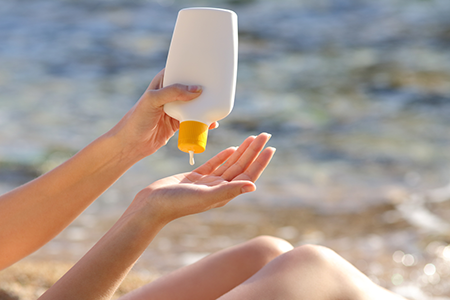
You are at an increased risk of the sun's harmful ultraviolet (UV) rays when traveling near the equator, during summer months, at high altitudes, and between 10 a.m. and 4 p.m. You can even be exposed to UV rays on cloudy days! Reflection from the snow, sand, and water increases sun exposure, so protect yourself from the sun during outdoor activities, including skiing (snow or water), spending time at the beach, swimming, and sailing.
Protect yourself from the sun
- Stay in the shade, especially during midday hours (10 a.m. to 4 p.m.).
- Wear clothing to protect exposed skin.
- Wear a hat with a wide brim to shade the face, head, ears, and neck.
- Drink plenty of non-alcoholic fluids.
- Wear sunglasses that block both UVA and UVB rays.
- Use sunscreen.
- Use SPF 15 or higher.
- Look for "blocks UVA and UVB" or "broad spectrum" on the label.
- Apply sunscreen liberally (minimum of one ounce) at least 20 minutes before sun exposure.
- Apply sunscreen to all exposed skin. Remember to apply to ears, scalp, lips, neck, tops of feet, and backs of hands.
- Reapply at least every two hours and each time you get out of the water or sweat heavily.
- If you are also using insect repellent, apply sunscreen first and repellent second. Sunscreen may need to be reapplied more often.
- Throw away sunscreens after one to two years.
- Avoid indoor tanning. Getting a "base tan" before your vacation damages your skin and doesn't protect you from sun exposure on your trip.
Treating a sunburn
- Take aspirin, acetaminophen, or ibuprofen to relieve pain, headache, and fever.
- Drink plenty of water, and soothe burns with cool baths or by gently apply cool, wet cloths.
- Use a tropical moisturizing cream or aloe to provide additional relief.
- Don't go back into the sun until the burn is healed.
If skin blisters, lightly bandage or cover the area with gauze to prevent infection. Don't break blisters (that would slow healing and increase risk of infection). Apply antiseptic ointment if blisters break.
Seek medical attention if any of the following occur:
- Severe sunburn, especially if it covers more than 15% of the body
- Dehydration
- High fever (above 101°F)
- Extreme pain that lasts more than 48 hours
